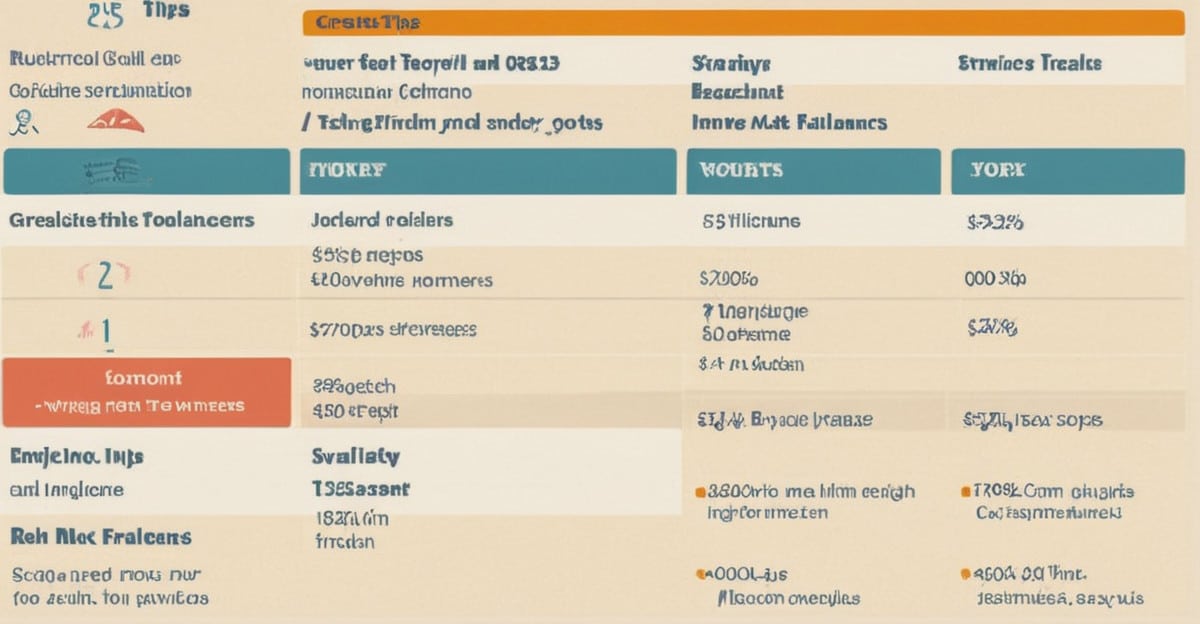Introduction
Although freelancing has a great deal of flexibility and freedom, it also has its share of financial difficulties. Since freelancers don’t receive a fixed salary like those in traditional employment, it’s critical to manage money well. We’ll look at budgeting suggestions for freelancers in this in-depth tutorial to help you reach financial security in 2024. Whether you’re a novice or an experienced freelancer, following these pointers can help you reach your financial goals.
Why Budgeting is Crucial for Freelancers
The foundation of sound financial management, particularly for independent contractors, is budgeting. It can be difficult to forecast your income and expenses if you don’t receive a regular paycheck. A well-crafted budget ensures that you can pay for your expenses even in the most difficult of times.
To start, budgeting aids in keeping account of your earnings and outlays. Knowing where your money is going and where you can make savings if necessary requires knowing this. You can spot spending patterns and make wise financial decisions by keeping track of every dollar.
Secondly, you can strong>plan for taxes with the use of a budget. In contrast to salaried staff, independent contractors must budget for taxes. Making a proper budget helps to guarantee that you are not caught off guard come tax season.
Lastly, creating a budget aids in establishing financial goals. A budget provides you with a clear road map for reaching your financial goals, whether they are related to building an emergency fund, investing in your business, or preparing for a major purchase.

Tracking Your Income
Precisely monitoring your earnings is a crucial initial step in creating a budget. Since freelancers’ revenue is often erratic and unpredictable, maintaining thorough records is crucial.
Begin by recording each payment you get in a spreadsheet or with budgeting software. Add information like the amount, the client’s name, and the date. This makes it simpler to monitor past-due payments in addition to aiding in the comprehension of your monthly profits.
To keep your personal and work finances apart, think about opening a second bank account. This facilitates the tracking of revenue and the management of expenditures associated with your freelance employment.
Finally, remember to factor in any additional revenue sources like digital product sales, consulting, or affiliate marketing. When you’re budgeting as a freelancer, every dollar matters.
Managing Expenses
For independent contractors, controlling spending is essential to creating a budget. Freelancers frequently have to pay for business-related expenses out of their own wallets, in contrast to conventional workers.
Sort your spending into fixed and variable categories first. Variable expenditures, like marketing and supplies, can change each month, but fixed costs, such rent and electricity, are the same every month.
Make a thorough account of every expense you incur each month after that. Both personal and commercial expenses are included in this. A detailed view of your outflows can help you find places where you can make savings and reductions.
Use tools for budgeting that can automatically classify your expenses based on your bank account. In addition to saving time, this can give you a more accurate view of your spending patterns.
Finally, make sure you’re remaining inside your budget by periodically reviewing your costs. You can modify your expenditures and maintain compliance with your financial objectives by conducting regular reviews.

Building an Emergency Fund
For independent contractors, having an emergency fund is a vital source of financial security. It acts as a safety net in hard times or for unforeseen costs, making sure you can pay for necessities without incurring debt.
Establish a savings target first for your emergency fund. Storing three to six months’ worth of living expenditures is a fair rule of thumb. This sum may differ based on your individual situation and level of risk tolerance.
Next, open a different savings account that you will only use for your emergency fund. By doing this, the temptation to use these savings for non-emergency costs is lessened.
By establishing a regular transfer from your checking account to your emergency fund, you may want to think about automating your savings. Over time, even modest, consistent efforts can mount up.
Lastly, keep your emergency fund for actual emergencies only. This covers unforeseen health care costs, auto maintenance, or a substantial reduction of income. Keep an eye on your savings target and make any adjustments to make sure you’re well-equipped to handle any financial surprises.
Planning for Taxes
Tax planning is a year-round endeavor for independent contractors. Freelancers must pay their own taxes, including self-employment tax, federal, state, and municipal taxes, in contrast to regular employees.
Determine your tax liability and estimate your annual income first. This provides you with a ballpark estimate of the monthly tax payment amount.
Next, think about paying your estimated taxes on a quarterly basis. By doing this, the tax burden is distributed and underpayment penalties are avoided. You can compute these payments with the assistance of the IRS’s guidelines and worksheets.
Several of your business expenses may be subtracted from your taxable income, so be sure to keep thorough records of all of them. This covers charges for things like office supplies, software, and airfare.
Think about seeking advice from a tax expert who specializes in assisting independent contractors. They can guarantee that you are in compliance with all tax laws and offer insightful guidance on tax deductions.
Finally, open a different savings account specifically for paying your taxes. A part of your income should be sent into this account on a regular basis to guarantee that you have enough money to pay your taxes on time.

Setting Financial Goals
For independent contractors, planning must include setting financial objectives. Well-defined objectives offer guidance and inspiration, assisting you in maintaining concentration on your financial goals.
Establish your short- and long-term financial objectives first. Long-term objectives can include purchasing a home or setting aside money for retirement, while short-term objectives might be paying off debt or saving for a trip.
After you’ve determined your objectives, divide them into manageable steps. Determine how much you need to save each month to meet your goal within the timeframe you have set, for instance, if your aim is to save $10,000 for a down payment on a home.
When defining your objectives, think about applying the SMART criterion. SMART stands for Time-bound, Specific, Measurable, Achievable, and Relevant. Your goals will be more achievable and realistic with the help of this framework.
Review your goals often and make any necessary adjustments. Your financial goals should adapt to the changes in your life circumstances. To stay on track with your goals, be adaptable and ready to make adjustments to your budget.
Finally, acknowledge and appreciate your progress. Acknowledging your progress can inspire you and strengthen wise financial practices.
Saving and Investing
For independent contractors, investing and saving are crucial parts of their financial strategy. You can achieve long-term financial stability and wealth building with the aid of these tactics.
Make regular savings a habit to begin with. Even a tiny percentage of your monthly income should be set away for savings. Over time, maintaining a sizable savings pool requires consistency.
Next, think about starting a savings account with a high yield. Your money will increase more quickly with these accounts since they have greater interest rates than conventional savings accounts.
Examine your investing possibilities after you have a stable base of savings. While investing carries greater risks than savings accounts, it can yield bigger rewards. Real estate, mutual funds, equities, and bonds are examples of common investment possibilities.
To create an investing strategy that fits your goals and risk tolerance, think about speaking with a financial counselor. They can offer insightful information and support you in making wise choices.
Finally, spread out your investment risk by diversifying them. In the long run, a well-diversified portfolio will yield more consistent returns and help safeguard your wealth amid market turbulence.
Managing Irregular Income
Managing erratic revenue is one of the main issues facing freelancers. The income of independent contractors might vary significantly from month to month, in contrast to that of salaried workers.
Establish a baseline budget by starting with your lowest monthly income. This guarantees that even in the most difficult months, you can pay for your necessities.
Next, create a buffer fund to make up for losses during times of low income. This fund serves as a safety net, keeping your finances stable even in the event of erratic wages.
To lessen your dependency on a single source of money, think about diversifying your sources of revenue. This could entail experimenting with different service offerings, managing several clientele, or looking into passive income sources.
Review and modify your budget on a regular basis to account for variations in your revenue. During tight months, maintain your flexibility and be ready to reduce non-essential spending.
Lastly, engage in responsible money management. When your salary is strong, resist the need to overspend and instead concentrate on increasing your investments and savings for long-term financial security.

Tools and Resources for Freelancers
The correct instruments and resources are needed for effective budgeting. Thankfully, there are several of apps and programs made especially to assist independent contractors with money management.
Start with programs that help you manage your money, such PocketGuard, YNAB (You Need A Budget), or Mint. These apps have the ability to classify expenses, connect to your bank accounts, and reveal information about your spending patterns.
Take into consideration utilizing programs like Wave, QuickBooks, or FreshBooks for invoicing and payment monitoring. These platforms facilitate the management of your freelance business with features like financial reporting, cost monitoring, and invoicing.
The intricacies of freelance taxes can be easier to understand if you use tax preparation software like TurboTax or H&R Block. These resources guarantee that you’re maximizing all allowable deductions and offer step-by-step instructions.
To stay organized and manage your workflow, think about utilizing project management software like Asana or Trello. You can monitor project schedules, handle client correspondence, and make sure you’re meeting deadlines with the aid of these tools.
Lastly, spend money on resources for professional development like webinars, industry conferences, and online courses. Maintaining your competitiveness and raising your earning potential as a freelancer can be achieved with continued education.
Conclusion
For independent contractors, budgeting is an essential talent that lays the groundwork for both success and financial security. You can confidently handle the particular financial challenges of freelancing if you know how important it is to create a budget, keep track of your earnings and outlays, save and invest, plan for taxes, set financial goals, and make use of the appropriate tools and resources.
Recall that creating a budget is a continuous process rather than a one-time event. Review and modify your budget on a regular basis to account for changes in your earnings and outlays. Remain knowledgeable, observant, and committed to your financial objectives. By using these freelance budgeting tips, you can take charge of your money and succeed in the long run in 2024 and beyond.






